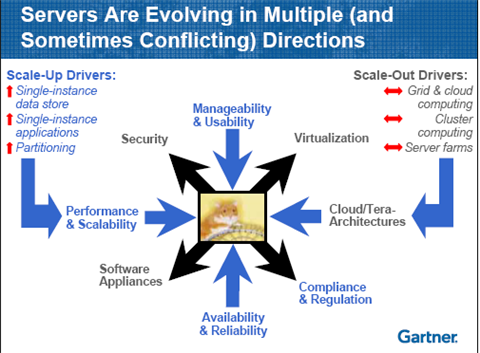Gartner: Windows collapsing under its own weight; Radical change needed

Microsoft's Windows juggernaut is collapsing as it tries to support 20 years of applications and becomes more complicated by the minute. Meanwhile, Windows has outgrown hardware and customers are pondering skipping Vista to wait for Windows 7. If Windows is going to remain relevant it will need radical changes.
That sobering outlook comes courtesy of Gartner analysts Michael Silver and Neil MacDonald. Half of a full room of IT managers and executives raised their hands when asked whether Microsoft needed to radically change its approach to Windows. "Windows is too monolithic," says Silver.
Silver also gave another anecdotal point to show the conundrum Microsoft is in: Clients are calling him to ask whether they should skip Vista entirely and wait for Windows 7, which promises to be more modular and potentially lightweight. Adrian Kingsley-Hughes has also found an impact on Vista from all of the Windows 7 chatter. Silver's recommendation: Go with Vista but on an attrition basis. As XP PCs die, replace them with Vista PCs.
MacDonald argued that Windows may need multiple kernels to support increasing demands from customers and hardware makers. "One size doesn't fit all," says MacDonald. For instance, look at the various demands an OS has to deal with:
If Microsoft's response is to become more complex Windows' fall will accelerate. As Windows stands today it's already too bulky.
So what does Microsoft need to do?
For starters, Windows should create versions for specific uses. These modules would be able to swapped out depending on the customer. From Gartner's presentation:
The more interesting question here is whether one OS can address both architectural requirements. Microsoft believes that it can take its core Windows software offering and package it to address these different architectures. But can this same approach be extended to embrace cloud computing and real-time architecture demands?
Also see: Jason Perlow: If I were to design Windows 7
Mary Jo Foley:Why Windows 7 might go to pieces
Multiple Windows--that will be virtualized of course--will screw up Microsoft's business model. "Microsoft doesn't like anything in between Windows and the hardware. Ninety-five percent of its revenue comes from OEM's," says MacDonald.Regardless of the pain for Microsoft, the software giant needs to shorten development times and innovate on an ongoing basis, make its experience consistent between platforms and solve compatibility problems among various flavors of Windows.
A few key redesign ideas from Silver and MacDonald:
Windows should be able to be tailored to specific applications. MacDonald questioned what the OS will become once applications are virtualized. Do you need a full OS everywhere? No. The job of an OS may be taken over by the hypervisor. Stray thought: Taking that logic further perhaps VMware becomes the real OS.
Better security. MacDonald says Windows should link identities to applications so software doesn't act abnormally. For instance, Notepad would be limited to inputting text. Why would notepad.exe have rights to network ports, the registry and scan a file system? Notepad should be assigned an identity and limited to a specific use. "Microsoft doesn't do this today," says MacDonald. "It would require significant kernel changes." MacDonald added that few operating systems limit what applications can do. The one software project that takes this approach is the One Laptop Per Child project.
Make migration to new versions easier. Application packaging takes forever, says Silver. There's also the problem of "Windows rot." Windows rot is what happens to a machine after running Windows for three or four years and it gets slow and barely functions. The fix is to reinstall everything and rebuild the PC. That's a manual effort that takes too much time.
Simplify licensing to focus on specific devices. "Licensing is too difficult for mere mortals to understand," says Silver. The problem: A version of Windows is tied to one PC. The way people work today will require a licensing do over, argues Silver. From Gartner's presentation:
It is possible that several entities will own different hardware and software components on a single machine, and there needs to be flexibility in ownership, management and movement of the assets. Microsoft Windows and Office licenses are ultimately tied to the device and not to the user, which makes no sense in a world in which a user's work space migrates between multiple devices.
"Something as common sense as 'I'd like Office to go with me' doesn't work under current licensing," says MacDonald.
The bottom line for Gartner is that Windows needs to be replaced, lock-in needs to end and product schedules need to be more predictable. Windows should also be more manageable. The Windows user experience will become less integrated to become "a composite adaptive work space," which means in English that some applications will be tied to location and the user's identity.
All of these items are good ideas that are very academic. Will Windows 7 become this adaptive thing that Gartner describes? Probably not. Gartner argues that Microsoft should use virtualization to solve the backward compatibility issue plaguing Windows. Will Windows 7 jettison its current kernel for multiple versions? Not likely.
Some of these changes may happen, but the move will be gradual at best. I agree that Windows has too many legacy constraints with reverse compatibility, but what would happen if Microsoft did a clean break from older apps? Meanwhile, these "legacy constraints" have also provided billions of dollars in revenue for Microsoft. One of the reasons Microsoft has a monopoly is because it still works with older stuff. If Microsoft did a clean break it would give you an excuse to pick a new operating system.
Windows clearly needs to change, but the question is really timing. How fast will Windows collapse under its weight? It'll take longer than folks think.
